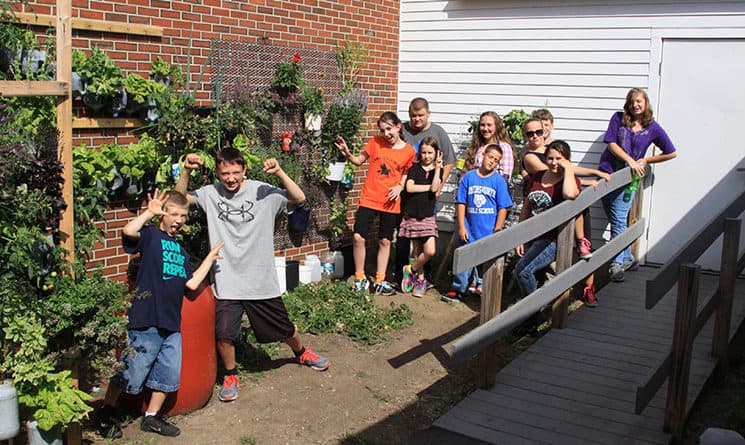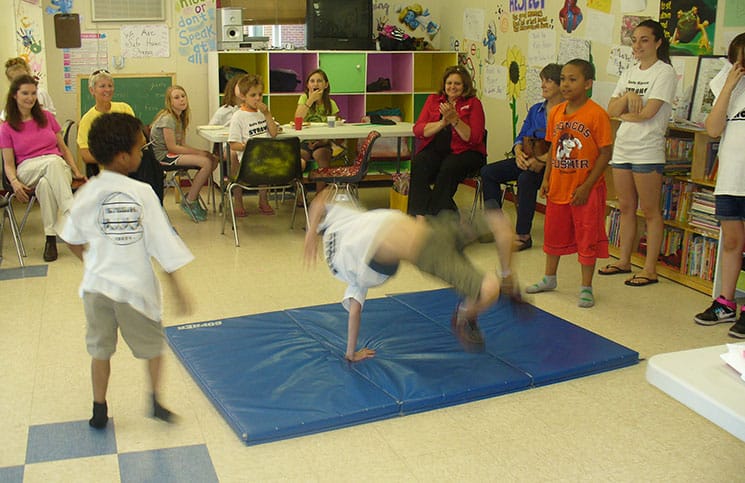When Betty Eaton and her husband Roger moved into their Somersworth Housing Authority apartment on Bartlett Avenue in October 2006, one of their windows looked out on the entrance of the Somersworth Youth Safe Haven (SYSH). Eaton saw the children — some from the neighborhood, others from around the city — enter and leave the after-school program each day.
And so, months later, when someone suggested she volunteer at the Safe Haven’s summer program, Eaton agreed. She loved working with the kids, and so she came back a second year, and then a third. And then, when the program’s coordinator retired, Eaton took over the job.
“They couldn’t get rid of me,” she jokes.
Eaton is retiring this month, and the Somersworth Youth Safe Haven is retiring with her. The center’s last day is June 18. It’s the end of a 15-year run for the program, which Eaton says has helped hundreds of Somersworth children and families.
“It’s heartbreaking. These kids look at this place like home,” Eaton says. “It’s been a whole family program, not just the kids.”
About 36 students were enrolled in the program this year, according to Eaton. SYSH operates year-round, and, in the summer, enrollment numbers can get as high as 50 or 60 students, who range in age from 5 to 18. The building includes separate rooms for elementary-, middle-, and high-school students, along with a game room stocked with board games, a foosball table, and a small karaoke machine.
Those rooms are also full of memories for Eaton. On a recent Tuesday morning, she walked through the building, showing off poster-board displays of SYSH activities from the last 15 years and reminiscing about the afternoons she’s spent there with Roger (who has volunteered alongside Eaton for the last eight years) and all the kids, parents, and volunteers who shaped the program.
“It’s hard to imagine the Safe Haven is just going to go away and disappear,” she says.
Ending an era
The Somersworth Housing Authority oversees SYSH. The program, along with a police substation, was established in the housing authority complex on Bartlett Avenue in 2000. Funding for the program was initially provided in part through a five-year grant from the Milton S. Eisenhower Foundation. When that grant expired, the city, the housing authority, and a number of donors and sponsors filled in the funding gaps.
But, as the years went on, funding was increasingly difficult to come by, Eaton says. Now, with her retirement, the housing authority is ending the program and merging its offerings with Somersworth Youth Connection (SYC), another after-school program located at Somersworth Middle School and Idlehurst Elementary School.
Though Eaton says Somersworth Youth Connection is a good program, it’s not the same as the Somersworth Youth Safe Haven.
“Safe Haven fits the kid … we don’t make the child fit the program,” she says. Many of the children enrolled at SYSH come from difficult home lives; a few have been kicked out of other after-school programs but have found a home at Safe Haven, according to Eaton. The program charged families $5 a week, though Eaton says, “we never turned anybody away, and never kicked anyone out if they couldn’t pay.”
Part of what made SYSH different is that it went beyond helping kids with homework and keeping them out of trouble, Eaton says. There were summertime field trips and a variety of classes — yoga, sign language, cooking, and others — and a community gardening program that came about through a collaboration with University of New Hampshire faculty and students. Eaton and her husband took older students to Hackmatack Playhouse in Berwick, Maine, where they volunteered at the concession stand, ushered audiences to their seats, and watched plays.
“If the kids need shoes, we’ll get them shoes. If they need jackets, we’ll get them jackets. If they need food, we’ll get them food.”
— program coordinator Betty Eaton
Beyond the programs, SYSH was a place for kids and their families to get all kinds of help and support, even if it was just a hug in the morning before school.
“If the kids need shoes, we’ll get them shoes. If they need jackets, we’ll get them jackets. If they need food, we’ll get them food,” Eaton says.
If parents needed help, they’d find it at SYSH, too —volunteers worked with parents on writing resumes, filling out housing applications, and getting their GED.
“They’ve helped us to be better parents,” says Tracy Willaman. She received custody of her two nephews, Paul and Quin, two years ago, and they’ve been coming to SYSH ever since.
“We went from having no kids to having a 6 and 7-year-old, and so (SYSH staff and volunteers have) been our mentors a lot. We’ve been able to turn to them and run ideas by them, and have parenting classes and cooking classes. They’ve been amazing for our whole family,” she says.
Paul and Quin are having a hard time coping with SYSH’s closing, Willaman says. “They’re very upset right now at the thought of not having the Safe Haven and not having Betty and Roger,” she says. “It’s going to be sad. The community will be losing a lot when the Safe Haven closes.”
Extended family
Safe Haven volunteers are also having a hard time saying goodbye to the program. University of New Hampshire student Sarah Gartska began volunteering at SYSH in May 2012. She started as an intern working on the Plant For Growth Community Garden Project, a collaboration between the university and SYSH that turned an empty lot in the housing authority complex into a community garden. When her internship was over, though, Gartska continued to volunteer.
“I felt like these kids were the kids who needed the most and got the least,” she says. “I became involved with them and worried about each of them.”
For Gartska, SYSH was “a guarantee” for the kids enrolled there. “It’s a guarantee that there’s someone there who cares about them, a guarantee for food, and clothes, and love, that they have something they can depend on,” she says. “A lot of kids have had turmoil in their lives, and they feel as though everything is fleeting and temporary. Safe Haven was something permanent they could count on.”
According to Eaton, volunteers from UNH and throughout the community have helped keep SYSH going. And the bonds they make are lasting — volunteers and children and families in the program stay in touch and come back to visit.
“We all get attached to each other,” Eaton says.
Eaton is technically a part-time employee at SYSH, but in reality, it’s a full-time job, she says. And, though she’s retiring to focus on her health, she plans to stay involved. She’s joining the board of directors at the Somersworth Early Learning Center, which is also located in the Bartlett Avenue complex.
The last few weeks have been tough for Eaton, her husband, the volunteers, and the kids. They recently had T-shirts made reading “Safe Haven Strong” and have been making and posting signs around the building about what Safe Haven means to them. One volunteer made a video of Safe Haven activities set to Taylor Swift’s song “Shake It Off.” The rooms are starting to get emptied out and families like Willaman’s are making new plans for the summer.
“They’re really having a hard time with it,” Eaton says.


